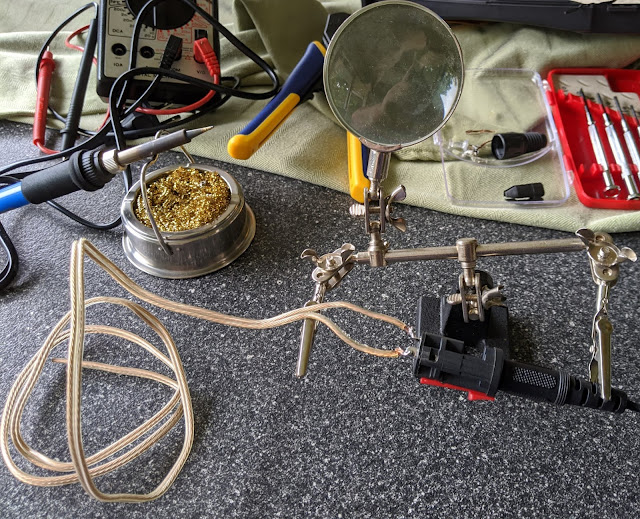The wonder that is the FlexRadio 6400, SmartSDR and WSJT-X
So, it's been a bit since my last update. During that time, life kinda got in the way, and then we all got introduced to this thing called COVID-19. Here's to hoping life levels-out a little bit here soon!
During this time, I have been lucky to be granted remote access to Lu W4LT's FlexRadio 6400. Having been a big fan of Icom since my first HF experiences, I will say that I think a FlexRadio 6400 will be my next radio! It is a fully-featured radio that has remote capabilities built-in to it from the beginning, instead of most radios/setups where remote is an after-thought. FlexRadio offers the SmartSDR app for remotely controlling their radios, and it's available for Windows and iOS. Hopefully one day it'll also be available for Linux and Android!
I got started on it getting ready for Florida QSO Party (since we can't run from the clubhouse, and I'm a man-without-a-shack atm), so I have it all set-up with my Yamaha CM-500 headset. In the next day or so I'll get the final piece to assemble my USB-to-serial-to-1/4 jack-to-footswitch PTT setup using SmartSDR: that'll likely be my next blog entry.
While playing around with SmartSDR, I wondered how easy/hard it would be to interface WSJT-X to SmartSDR. I checked out a few YouTube videos that, while older, gave me a lead into how the remote mechanics for CAT/PTT/DAX would work. Using that, I compiled the following instructions for using SmartSDR 3.1.8 to interface with WSJT-X, and have used it to successfully make a few dozen FT4/FT8 QSOs. Hopefully this helps someone else out in the future!
I got started on it getting ready for Florida QSO Party (since we can't run from the clubhouse, and I'm a man-without-a-shack atm), so I have it all set-up with my Yamaha CM-500 headset. In the next day or so I'll get the final piece to assemble my USB-to-serial-to-1/4 jack-to-footswitch PTT setup using SmartSDR: that'll likely be my next blog entry.
While playing around with SmartSDR, I wondered how easy/hard it would be to interface WSJT-X to SmartSDR. I checked out a few YouTube videos that, while older, gave me a lead into how the remote mechanics for CAT/PTT/DAX would work. Using that, I compiled the following instructions for using SmartSDR 3.1.8 to interface with WSJT-X, and have used it to successfully make a few dozen FT4/FT8 QSOs. Hopefully this helps someone else out in the future!
* Caveat: This how-to assumes that you've installed SmartSDR, SmartSDR CAT, SmartSDR DAX, and WSJT-X on your machine, including all of the SmartSDR DAX Audio devices! *
1. Open SmartSDR, SmartSDR CAT, and SmartSDR DAX, and connect to your radio
2. In SmartSDR CAT: add a COM port for CAT by clicking "Add" button, and setting it to the following settings:
a. Name: WSJTX-CAT
b. Port Protocol: CAT
c. Port Type: Serial
d. Serial Port: FlexVSP
e. Client COM: COM11 (pick the next available port)
f. VFO A Slice: A
g. Auto Switch TX Slice: Enabled
h. Split Mode: SO2R (normal)
3. In SmartSDR CAT: add a COM port for PTT by clicking "Add" button, and setting it to the following settings:
a. Name: WSJTX-PTT
b. Port Protocol: PTT
c. Port Type: Serial
d. Serial Port: FlexVSP
e. Client COM: COM12 (pick the next available port)
f. VFO A Slice: A
g. RTS: RTS Enabled
h. Polarity: Active Low
i. Auto Switch TX Slice: Enabled
4. In SmartSDR: set mode to "DIGU" and input audio source to DAX, as shown by the yellow arrows on the image below:
a. TX: enabled and streaming
b. RX Streams 1 (Slice A): enabled and streaming
6. In WSJT-X: Create a new configuration, and set the following:
1. Rig: Kenwood TS-2000
2. Serial Port: COM11 (whatever you set "WSJTX-CAT" to in step 2 above)
2. Serial Port: COM11 (whatever you set "WSJTX-CAT" to in step 2 above)
3. Baud Rate: 115200
4. Data bits: 8
5. Stop bits: 2
6. Handshake: none
7. Force Control Lines: blank
8. PTT Method: RTS and COM12 (whatever you set "WSJTX-PTT" to in step 3)
9. Transmit Audio Source: grayed-out
10. Mode: None (this allows the radio to stay in “DIGU” mode)
11. Split Operation: Fake It
12. Test CAT Button: Click it and ensure it goes green
13. Test PTT Button: Click it and ensure it keys the radio
1. Input: DAX Audio RX 1 (FlexRadio Systems DAX Audio)
2. Output: DAX Audio TX (FlexRadio Systems DAX TX)
Now: try a QSO! If for whatever reason DAX RX or TX isn't working, try closing everything, then loading in this order:
1. SmartSDR
2. SmartSDR DAX
3. SmartSDR CAT
4. WSJT-X








Comments
Post a Comment